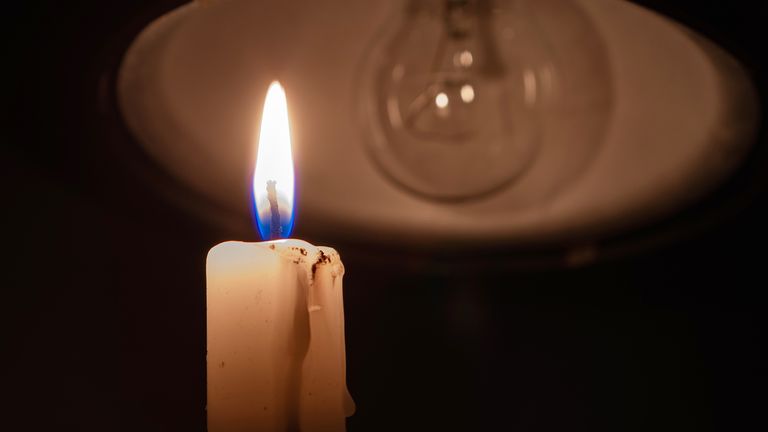The National Grid's warning that three-hour planned blackouts may have to be implemented this winter has left many feeling anxious.
People use more energy to keep warm in winter.
And while Britain has a considerable gas supply in the North Sea, we lack space to store it, which means we have to import around 30% from Europe during periods of increased demand.
But with Europe depending on Russia for much of its gas supply, those European imports could be cut off over the war in Ukraine.
The Grid's Electricity Systems Operator (ESO) is hoping to avoid blackouts by offering households money to reduce their energy use at peak times - but they still remain a possibility.
Here Sky News looks at how you can prepare and what to do if they happen.
Before the blackout
If blackouts are implemented this winter, people will be warned at least a day in advance, the Grid has said.
They are likely to be at peak times - between 4pm and 9pm or in the morning - and work on a rotation so not all areas of the country have their power cut at the same time.
Torches not candles
While some may have romantic notions of their houses lit by candlelight - that isn't the safest option.
Energy companies recommend keeping battery-powered torches in an easy-to-find place so you can use them if the lights go out.
Candles could be a fire hazard and put unnecessary pressure on the emergency services which need to dedicate resources to the vulnerable during blackouts.
Keep phones charged
Although blackouts will cut off Wi-Fi, people will still be able to access the internet, send messages and make calls using 4G.
Try not to let your phone battery run low - and invest in battery pack chargers to give you extra supply.
Write down emergency numbers
Increasing reliance on smartphones and devices means you may not know your friends and family's phone numbers by heart.
Keeping key contacts written down in an easily accessible place is important in case your phone runs out of battery.
The national power cut helpline - 105 - is also worth noting down as it offers free 24/7 advice.
Battery-powered radio
For those without smartphones, or in areas where 4G signal is poor, local radio stations can offer useful information in a blackout.
They have backup generators to allow them to continue broadcasting even when the power is out.
So keep enough batteries to power your radio without a mains supply.
Boiled water in flasks
Investing in flasks so you can store boiled water and keep it hot is a good idea ahead of planned blackouts.
Drinking hot water, tea or coffee is a good way to keep warm when the heating goes off.
Priority Services Register
People who are vulnerable, or look after elderly or disabled friends or relatives, can sign up for the Priority Services Register through their energy supplier.
Tom Marsland, policy manager at the disability charity Scope, says: "Through the Priority Services Register energy companies should know what equipment their disabled customers rely on and what would happen to them if they are cut off.
"Companies are under an obligation to warn their disabled customers on this register in advance of any power cut and prioritise them when they are trying to reconnect power."
Read more:
How worried should we be about lights going out?
Analysis: Key winter outlook takes on particular significance
This will mean those relying on ventilators or dialysis machines may be given backup energy supplies ahead of the power cut so they are not put at risk.
You can be added to the PRS if you are - of state pension age, disabled or have a long-term medical condition, are recovering from an injury, your vision or hearing is impaired, you have a mental health condition, are pregnant or have a child aged under five, or you have difficulties speaking English.
Save your work
Although power cuts are likely to be in the evening, they may happen in the morning or during the last few hours of the working day.
Keep your laptop charged and turn on auto-save functions so that you don't lose your work during a blackout.
Check on neighbours
The Grid has promised to warn people of blackouts at least a day beforehand, so if you have elderly or vulnerable neighbours, friends or relatives, pay them a visit to check they have everything they need to keep warm and safe when the lights go out.
Inviting them to visit or stay on the day of the blackout may give you better peace of mind if you're particularly worried about someone and have the space.
Click to subscribe to the Sky News Daily wherever you get your podcasts
During the blackout
The usual advice about how to deal with a tripped switch and resetting your fuse box won't apply in a planned blackout.
Here's what you can do to stay safe and warm when the power goes off.
Stay at home
Arranging to be at home during the blackout hours will make things less stressful.
Most businesses will have to close during power cuts but driving or being in a public space could leave you vulnerable.
Keep fridge doors shut
Food and drink should last in the fridge or freezer for a few hours with the doors kept closed, which means you shouldn't have to throw any food away after a three-hour blackout.
When getting things out of the fridge, do it quickly and remember to close the door immediately afterwards.
Dress up warm
Wear lots of layers and keep blankets in an easily accessible place.
Hot water bottles, hand warmers and heat pads can all help to keep warm.
Unplug fish tank filters
Fish and reptiles that live in tanks will survive for a couple of hours without power.
It's important to unplug fish tank filters, however, as this will stop harmful toxins entering the water.
Use the car
Cars can offer an emergency source of heating and electricity.
Most cars have USB charging points if you need to charge a device, but be careful not to do it for too long, as it will run the car battery flat without the engine on.
Leave a light on
Leaving a light switched on during the blackout will mean you know immediately when power is restored.
But remember to turn appliances like irons and electric fires off in case they come back on unexpectedly and risk starting a fire.
Stair lifts
If you or a friend or relative rely on a stairlift, check if they have a manual handle or backup batteries.
Those who have mobility problems are likely to be on the Priority Services Register, so will be eligible for extra support during the blackout.
How can we avoid blackouts?
The National Grid has said planned blackouts are a last resort - and they can hopefully be avoided if we manage our energy demand at peak times.
The Grid's ESO has said it will run a "demand flexibility service" from 1 November until March, which will see households encouraged to use their dishwashers, tumble driers and washing machines at non-peak times with financial incentives.
It is hoped the scheme will deliver 2GW of power savings to balance supply and demand, preventing any disruption.
Saving energy on a daily basis could also help prevent the need for power cuts.
The biggest energy-saving action you can take is to have your central heating set to a lower temperature. Turning the thermostat down by two degrees from 20C to 18C will save 3,093 kWh per year.
This will save more than 4.6 times as much energy as delaying turning on the heating from October to November and 23 times as much energy as switching off the lights when they are not in use.
Central heating is by far the biggest drain on energy in our homes. More than three-fifths of the energy that we use is on heating our living spaces, compared to just 17.6% on heating water.
In terms of appliances, we tend to spend the most on high-use electric devices such as electric showers and hobs, costing the average household a combined £6.68 a week. Freezers and kettles are also among the most costly items.
https://news.google.com/__i/rss/rd/articles/CBMifWh0dHBzOi8vbmV3cy5za3kuY29tL3N0b3J5L3dpbGwtZm9vZC1nby1vZmYtaW4tdGhlLWZyaWRnZS1hbmQtd2lsbC1teS1wZXQtZmlzaC1zdXJ2aXZlLWhvdy10by1wcmVwYXJlLWZvci1hLWJsYWNrb3V0LTEyNzE0MjIy0gEA?oc=5
2022-10-07 11:54:41Z
1594366385


Tidak ada komentar:
Posting Komentar